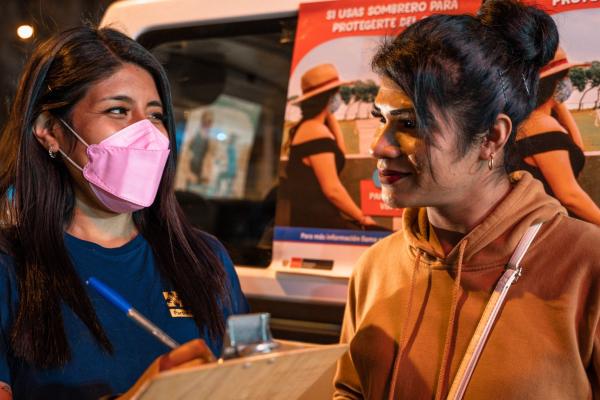More health, less stigma. Under this slogan Partners In Health (SES) kicked off June, LGBTIQ+ Pride Month around the world, to make visible the pending challenges to achieve a health system free of discrimination and respectful of all diversities.
According to the II National Survey on Human Rights: LGBT Population, in Peru 47% of people from the community said they felt “very discriminated against” in society, a problem that is replicated in other areas, such as health facilities.
While it is true that national data is scarce, in United States, for example, 56% of gay, lesbian and bisexual people said they had faced cases of discrimination in medical services such as: refusal of medical attention; being blamed for their state of health; rude language, among other mistreatment by medical personnel.
The situation worsens if we talk about other diversities. In Chile, the First Survey for transgender people revealed that 95% of transgender people had suffered discrimination in health centers.
Aware of this problem that is not alien to our country, at Socios en Salud we are united by the commitment to create safe and inclusive spaces with comprehensive and quality health for all people, which is why it becomes necessary to make visible three pending challenges that the Peruvian health system has with LGBTIQ+ people:
1. Stop stigmas about the LGBTIQ+ Community in health services
LGBTIQ+ people are more vulnerable to face mistreatment, harassment and even physical violence in health systems. Misplaced questions, stigmatization about sexual practices or denial of some procedures on the grounds of gender identity and sexual orientation are just some of the barriers they face that directly impact their physical well-being and mental health.
In this regard, health personnel trained in care for sexual and gender minorities are needed to ensure equal and quality care, free of stigma and respectful of all diversities.
2. Ensure safe and timely access to hormone therapy for the trans population
According to the Inter-American Commission on Human Rights (IACHR), the average lifespan for trans people in Latin America is 35 years. Factors such as limited access to basic health services, late treatment of STIs, HIV, and other diseases, as well as systematic violence leading to cases of homicide, shorten the life expectancy of the trans population in Peru.
In this regard, exercising their right to health, especially access to safe and timely feminization hormone therapies, remains a pending challenge. Although there is a guideline to provide this therapy, which is even covered by the Seguro Integral de Salud (SIS), along the way there are obstacles such as cases of discrimination by untrained medical personnel and scarce supply of medications to initiate such therapy, which can lead to cases of self-medication that impact the quality of life of trans women.
3. Ensure access to HIV and STI prevention and care services
Gay men, bisexuals and transgender women are the main group at risk of contracting HIV and STIs in Peru. Although since 2004 the Peruvian State has guaranteed universal and free access to antiretroviral drugs and treatment for HIV/AIDS, prevention will continue to be a key factor in the fight against this sexually transmitted infection and others.
In that sense, continuing to promote condom use campaigns, and above all advocating for the adoption as permanent public policy of free access to pre-exposure prophylaxis (PrEp), an effective prevention method to avoid HIV infection, as well as access to treatment as a strategy to prevent viral transmission to others, are essential tasks on which to generate awareness this month.
The work of SES in favor of the health of the LGBTIQ+ community
Through our HIV and STI Program we seek to strengthen comprehensive care: clinical, psychological and social in the prevention and care of sexually transmitted infections, from screening to the initiation and continuity of treatment, focusing on active search, detection and treatment that facilitates the timely initiation of antiretroviral treatment (HAART).
Thus, through our mobile health brigades, carried out in North Lima in men who have sex with men and in Metropolitan Lima in transgender women, 60% of 140 people were linked to the Centers of Reference for Sexually Transmitted Infections and HIV/AIDS (CERITSS) to start antiretroviral treatment.
Also, the last survey we conducted among 301 transgender women from 11 districts of Metropolitan Lima in 2022 revealed that:
- 40% had not been screened for HIV in the last year
- 40% had never been screened for tuberculosis
- 80% presented some degree of depression or violence
- 54% were engaged in sex work
As a result of these findings, we implemented a community strategy to improve and strengthen the clinical, emotional and psychosocial health of 370 transgender women in Metropolitan Lima, under the perspective of human rights and non-discrimination.
